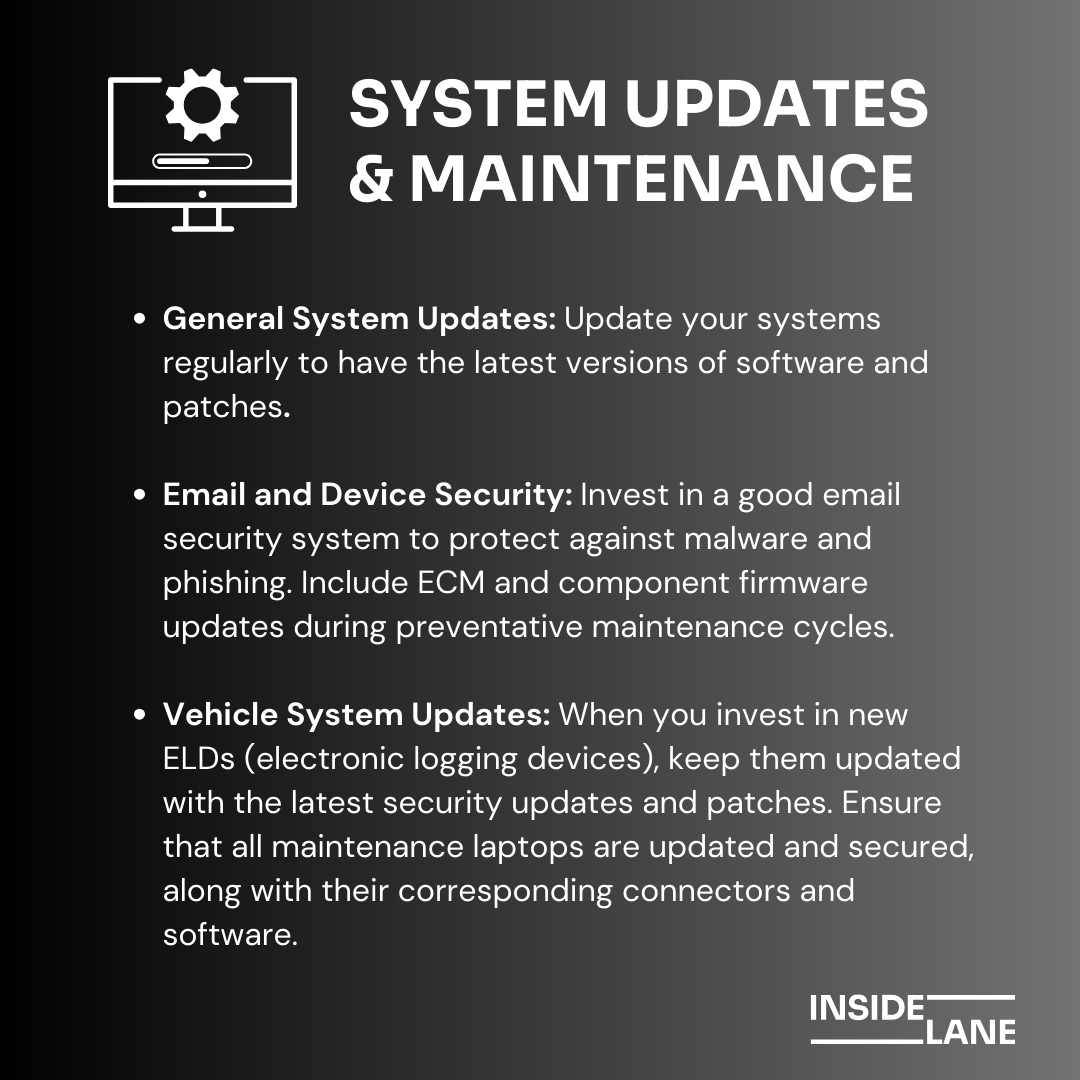Trucking Cybersecurity Checklist: Key Measures to Implement
[Part 3 of 3] Dive into effective cybersecurity strategies for trucking businesses, emphasizing prevention and easy-to-implement tips for protecting against cyber threats.

The Inside Lane compiled a comprehensive checklist that outlines vital cybersecurity measures that trucking companies need to implement to protect their operations and assets from increasing cyber threats. Part 3 of 3.
By Alan Schmadtke, for The Inside Lane
In today's digitally connected world, cybersecurity is no longer just a concern for IT departments but a critical business initiative, especially for trucking businesses.
As cybersecurity director for the National Motor Freight Traffic Association, Cara Walls spends a lot of time researching and understanding the potential online vulnerabilities of trucks and trucking businesses.
From emails to truck networks to an update on black hat hackers with bad intentions, there’s no shortage of potential issues.
“It doesn’t matter what research we do and how big our brains get about cybersecurity and trucking. It matters that we deduce that down, that it is digestible for all the people in the industry,” Wells said. “It really doesn’t matter what we know if we can’t articulate that and get that knowledge out there so that it actually makes a difference.”
Taking on cyber security measures
Fear of the unknown, fear of the complex, and the constant overwhelm of keeping a business running may prevent many trucking businesses from protecting their flanks from a cyber attack. These factors often stand in the way of creating and implementing a robust cybersecurity plan, leaving trucks and operations vulnerable to digital threats.
The good news? Business owners don’t have to understand computer code to take the proper steps to protect their fleet. They don’t have to invest much money, either.
But they should understand the stakes – the cost of being out of business for hours or days.
Cyber experts suggest that while drivers can be invaluable sources of information about a truck’s performance and what they see, hear and feel in the vehicle and the diagnosis of any problems, they should not be that active in the solution.
Security is maintenance, an issue for support and management, and it requires expertise.
Cybersecurity tips for trucking businesses
Following conversations with cybersecurity professionals, industry leaders and law enforcement, The Inside Lane has compiled a list of ways that fleet owner-operators and, sometimes, their employees, can shield their businesses and trucks from cyber criminals.
These tips go beyond the guidelines IT experts in corporate America have suggested for years, such as:
- Don’t open a work email from someone you don’t know and click on a link included in the email.
- Have a more complex and personalized login password for your devices and for the software and applications you use.
- Do not reuse the same password for multiple devices and applications.
- Avoid auto-saving passwords.
- Accept and use two-factor authentication when possible.
From a business standpoint, the biggest vulnerability for a fleet owner is unsecured data and unsecured systems. A ransomware attack can cripple a company by locking up its operations and by extorting it for a multi-million-dollar payday.
Next comes a back-shop breach that gives a criminal online banking access, setting the stage for illicit money transfers or payoffs to fictitious vendors (who are actually the cyber hackers).
Here are expert recommendations designed to protect trucking businesses from cyber threats, applicable to everyone from owner-operators to drivers, mechanics, and back-office staff. These tips provide a broad defense strategy, safeguarding against a variety of cyber risks.
(Article continues below the graphics)






Strengthening cybersecurity in trucking
The risk of having a truck hacked remains low - for now, but there are many ways that hackers are finding their way inside fleet businesses. Phishing emails, ransomware, and data breaches - can all disrupt and even halt a trucking company in its tracks.
In many ways, prevention is better than a cure when it comes to cyber security.
“I don’t know if you can ever be 100% protected,” said Trina Martin, a cyber intelligence analyst with the FBI. “But you should protect yourself as much as you can.”
Thank you for reading Part 3 of a three-part series about the trucking industry’s realization that it must enable more cyber-secure strategies and tactics.
Part 1 takes a look at the alarming trend of cyberattacks in trucking, a sector integral to the U.S. economy. Industry experts highlight the critical need for advanced cyber defenses. Read it here.
In Part 2, we delve into the realm of cyberattacks, examining vulnerabilities within truck and fleet operations and the measures being implemented to enhance security. Read it here.
Have a question or comment about this article? Email Bianca Prieto at editor@theinsidelane.co
Not yet a subscriber? Join here.





Comments ()